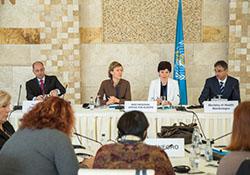Meeting in Montenegro addresses tobacco control strategies for south-eastern European countries

WHO/Željko Bracnović-Koks
On 24–27 October 2016 in Budva, Montenegro, WHO/Europe hosted a subregional meeting on the implementation of the WHO Framework Convention on Tobacco Control (WHO FCTC) in south-eastern European (SEE) countries. The workshop was an important step forward in better understanding the WHO FCTC’s full potential. It focused on the tobacco industry’s tactics for blocking tobacco control measures, key components of effective tobacco control policies and their implementation, and methods for defending anti-tobacco strategies.
Dr Boban Mugoša, Director of the National Institute of Public Health, representing the Ministry of Health of Montenegro, and Ms Mina Brajovic, Head of the WHO Country Office in Montenegro, welcomed 11 national delegations along with regional and global experts to the event.
Tackling the high prevalence of tobacco smoking to achieve the SDGs
During his opening remarks, Dr Mugoša warned that according to the latest national data, Montenegro has one of the highest prevalence rates of tobacco smoking among SEE countries.
Ms Brajovic reminded participants that in September 2015, world leaders agreed on the 2030 Agenda for Sustainable Development and its 17 Sustainable Development Goals (SDGs). One of the aims of the SDGs is to improve population health over the next 15 years. Goal 3 specifically sets out to “ensure healthy lives and promote well-being for all at all ages”, identifying health as a major contributor to and outcome of sustainable development policies.
The WHO FCTC entered into force in 2005 and is ratified by 50 European countries, including Montenegro. As Ms Brajovic emphasized, “The comprehensive implementation of the FCTC would be a measure of our success in achieving the SDGs.”
Dr Mugoša stressed that noncommunicable diseases (NCDs) are a leading cause of disability in the country, putting an increasing strain on the well-being of the population, on health systems working to treat patients and on overall economic development. He added that the Government of Montenegro has identified the provision of an effective response to the country’s growing NCD epidemic, aligned with WHO global and regional frameworks, as a strategic priority.
Dr Mugoša also noted that in July 2016, the Government adopted a new strategy on sustainable development that embeds health in every policy with a focus on reducing the burden of major NCDs and addressing related risk factors, such as tobacco smoking.
The meeting was organized with financial support from the Government of Turkmenistan.



